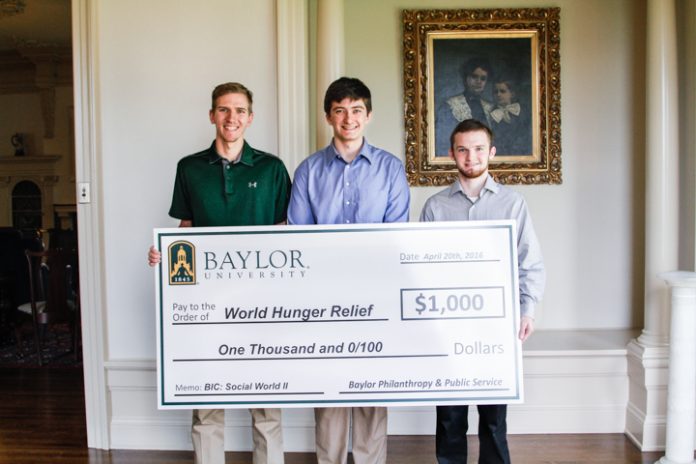
Four Baylor Interdisciplinary Core students won $1,000 for World Hunger Relief through the BIC Social World Philanthropy Project Wednesday.
Phoebe Suy, Mitchell Allen, Caleb Huff and Dennis Knowles wrote a mock grant request on behalf of World Hunger Relief as part of the BIC Social World Philanthropy Project. This project was an extra credit opportunity in sophomore-level course Social World II for BIC students within the Honors College. Social World II explores the idea of contemporary social justice in areas such as economic inequality, social forces and public values.
“They learn social theory, like how a society runs and what are some different theories about the best way that society can run,” said Dr. Candi Cann, one of the Social World II professors in the BIC. “In the second component of the course, we apply those theories in social justice, so we look at how those theories might apply, for example, in problems of race or problems of class or problems of gender.”
Although Social World II is a pre-existing course, BIC program coordinator Adam Moore said this is the first time the philanthropy project has been offered with the class, and the first time any class has done something quite like this.
“Baylor is wanting to allow more opportunities for students to engage with questions of philanthropy and nonprofit work and giving, throughout the university,” Moore said.
BIC students in Social World II who wanted to participate in the BIC Social World Philanthropy Project applied by writing a brief essay. Moore said that out of roughly 160 students in Social World II, about 30 applied for the project and 12 students were selected.
“We asked the students to commit to 20 hours for this additional experience within the course, and they are getting some extra credit for that commitment,” Moore said.
Roughly half of the 20 hours students spent on the project was spent in class discussions, while the other half was dedicated to researching a local nonprofit and writing a mock grant request on the organization’s behalf.
Students participating in the project were divided into three groups of four. The three nonprofits researched were World Hunger Relief, Family Abuse Center and Communities in Schools.
“A lot of Baylor students do service-learning projects and they do a lot of volunteering, but they don’t necessarily get the hands-on top-down training, and that was what was really different about this program,” Cann said.
Cann and Moore were two of the faculty involved with the project who were responsible for selecting the winning proposal. The other two faculty members involved were Dr. Charles McDaniel and Dr. Emily Glass.
The students’ winning grant won $1,000 from the Baylor Philanthropy and Public Service Program for World Hunger Relief.
“I was pleasantly surprised, because I know all the groups have put in a lot of work and effort, and I feel like we all had a really level playing field,” said Sillsbee sophomore Phoebe Suy. “Everyone was really deserving of it.”
Suy said that her group was really happy to win, because after they got to know the hearts of people working for World Hunger Relief, the students wanted to win them this funding.
“They created a vision that was articulate and really well thought out, but really, the most important thing was their vision was sustainable over the long term,” Cann said. “They didn’t just create a project that would meet short-term goals, but rather long-term goals could be built on top of those short-term goals. It was a project where $1,000 will eventually turn into $10,000 that will turn into $100,000.”
Cann said in addition to helping students learn how to write a grant, the project also helped them learn how to tell what makes a successful nonprofit organization and to develop leadership skills.
“I would like to see them become leaders in the community, as opposed to just servers,” Cann said. “I think those are two different skill sets. Lots of the Baylor community is very good at serving. They have servant-hearted attitudes, but I guess I want to help them become leaders and become leaders of change, to take more pivotal roles in the Waco community.”




